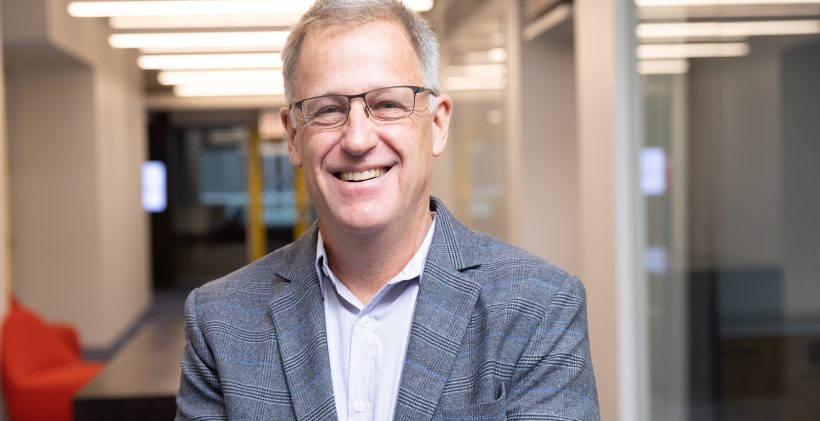Pioneer in cloud and high performance computing recognized for his pathbreaking achievements.
Ian Foster, a pioneer in cloud and high performance computing, was named the 2022 recipient of the Ken Kennedy Award, bestowed annually by the Association for Computing Machinery (ACM) and the Institute of Electrical and Electronics Engineers (IEEE).
Foster, a Distinguished Fellow and director of the Data Science and Learning Division at the U.S. Department of Energy’s (DOE) Argonne National Laboratory, was chosen for “the establishment of new programming models and foundational science services.” He is also the Arthur Holly Compton Distinguished Service Professor in the Department of Computer Science at The University of Chicago.
“I have been blessed to work with so many fantastic collaborators and students during my career — not least Ken Kennedy — and it is deeply fulfilling to see the systems we built used to push forward scientific frontiers in a multitude of fields.” — Ian Foster
The ACM – IEEE CS Ken Kennedy Award recognizes substantial contributions to programmability and productivity in computing and substantial community service or mentoring contributions. Foster will receive the award in November at the 2022 edition of The International Conference for High Performance Computing, Networking, Storage, and Analysis (SC22).
Foster was nominated for the award for several influential projects enabling the use of high performance and distributed computing systems for accelerating scientific discovery in fields ranging from physics, chemistry and astronomy to climate science, biomedicine and materials science. The Globus platform that he founded in 2010 with Steve Tuecke and others today has more than 300,000 registered users in 80 countries. This cloud-based software and services for data-intensive research allows scientists to easily transfer, share and compute on massive datasets.
Globus evolved from innovations by Foster and his colleagues in the field of grid computing, which capitalized upon the early availability of high-speed internet to create coordinated and distributed networks supporting large-scale scientific research. These grids were instrumental for major scientific collaborations such as the observation of the Higgs boson at CERN’s Large Hadron Collider and the science underlying the assessments of the Intergovernmental Panel on Climate Change. Today, grid concepts underpin the cloud that is fundamental to much of modern society.
With colleagues such as Steve Taylor, Carl Kesselman, Mike Wilde and Kyle Chard, Foster has also built new programming languages and systems for high-level parallel computing, including Strand, Nexus, Swift, Parsl and FuncX. Using these tools allows scientists to tap into large and distributed high performance computing resources, splitting up their data and tasks for faster execution.
“I am honored to receive the Ken Kennedy Award from the ACM and IEEE,” Foster said. “I have been blessed to work with so many fantastic collaborators and students during my career — not least Ken Kennedy — and it is deeply fulfilling to see the systems we built used to push forward scientific frontiers in a multitude of fields.”
In addition to his research, Foster has contributed to science as a communicator, educator and mentor. He has authored or co-authored oft-used textbooks on parallel computing, grid computing, data-intensive social science and cloud computing for science and engineering. At the University of Chicago and Argonne, he has advised and managed hundreds of students and early-career research scientists. From 2006 to 2018, Foster directed the Computation Institute, a joint initiative of UChicago and Argonne that developed and applied new computational methods across multiple fields of science and scholarship, and he currently directs Argonne’s Data Science and Learning division.
In addition to the Ken Kennedy Award, Foster has received the IEEE Charles Babbage Award, the Lovelace Medal of the British Computing Society, and the Gordon Bell Prize for High Performance Supercomputing. He is a fellow of the AAAS, ACM, BCS and IEEE, and a DOE Office of Science Distinguished Scientists Fellow.
Originally published by the University of Chicago.
Argonne National Laboratory seeks solutions to pressing national problems in science and technology. The nation’s first national laboratory, Argonne conducts leading-edge basic and applied scientific research in virtually every scientific discipline. Argonne researchers work closely with researchers from hundreds of companies, universities, and federal, state and municipal agencies to help them solve their specific problems, advance America’s scientific leadership and prepare the nation for a better future. With employees from more than 60 nations, Argonne is managed by UChicago Argonne, LLC for the U.S. Department of Energy’s Office of Science.
The U.S. Department of Energy’s Office of Science is the single largest supporter of basic research in the physical sciences in the United States and is working to address some of the most pressing challenges of our time. For more information, visit https://energy.gov/science.

